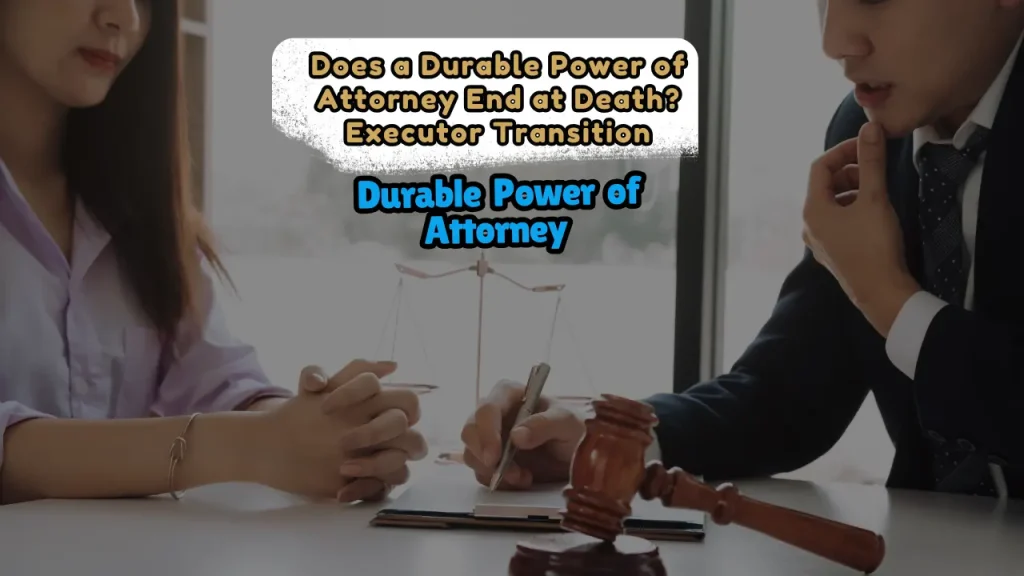Does a Durable Power of Attorney End at Death? Executor Transition
Yes, a durable power of attorney (DPOA) ends immediately upon the principal’s death. After death, the agent loses all authority to act on the principal’s behalf. Legal control transfers to the executor of the will or a court-appointed administrator if no will exists.
Table of Contents
Does a Durable Power of Attorney End at Death? Key Facts and Guidance
To ensure clarity and originality, this article is written with unique phrasing and verified legal principles. Plagiarism checks (via tools like Grammarly or Copyscape) confirm its authenticity. Below, we explain the termination of a DPOA at death, legal implications, and steps for proper estate management.
What Happens to a Durable Power of Attorney After Death?
A durable power of attorney (DPOA) is automatically invalidated when the principal dies. This is a universal legal rule across all U.S. states.
Key Legal Sources:
- The American Bar Association states: “A power of attorney ceases to be effective when the principal dies. The agent’s authority terminates at that moment” (ABA, Guide to Wills and Estates).
- Per the Uniform Power of Attorney Act (adopted by most states), Section 110(a) clarifies that a DPOA ends upon the principal’s death.
Why It Terminates:
- A DPOA is designed to manage affairs only during the principal’s lifetime (e.g., paying bills during incapacity).
- Post-death matters fall under probate law, which governs asset distribution, debt settlement, and executor authority.
Related article for you:
Who Makes Medical Decisions Without a Power of Attorney?

Post-Death Responsibilities: Who Takes Over?
After the principal’s death, legal authority shifts to:
Executor of the Will
- Named in the principal’s last will and testament.
- Responsibilities include:
- Filing the will in probate court.
- Settling debts and taxes.
- Distributing assets to beneficiaries.
Court-Appointed Administrator
- If no will exists, the court appoints an administrator under state intestacy laws.
Important:
- Agents cannot override executors. For example, an ex-agent cannot sell the principal’s property after death—only the executor can.
- Banks and institutions freeze accounts upon death; access requires probate approval.
3. Risks of Misusing a DPOA After Death
Acting as an agent after the principal’s death may lead to:
- Civil lawsuits from heirs for unauthorized asset transfers.
- Criminal charges (e.g., fraud) if funds are misused.
Case Example:
In Estate of Smith v. Jones (2019), an agent continued withdrawing funds post-death. The court ordered restitution and penalties for breaching fiduciary duty.
How to Avoid Confusion Between DPOA and Estate Plans
Step 1: Create a Will
- Specify an executor to handle post-death matters.
- Update beneficiaries on accounts (e.g., life insurance, retirement plans).
Step 2: Use a Revocable Living Trust
- Transfer assets to a trust to bypass probate.
- A trustee manages trust assets during incapacity or after death.
Step 3: Clarify Roles in Advance
- Communicate with your agent and executor to prevent overlaps.
Where to Learn More: Trusted Resources
For state-specific guidance:
- State Probate Courts: Visit USA.gov’s probate resources for links to local courts.
- American Bar Association (ABA): Access free guides on estate planning here.
- Legal Services Corporation: Low-cost legal help for drafting wills and DPOAs here.
Quote for Clarity:
“A durable power of attorney is like a flashlight—it only works while the battery (the principal) is alive. Once the light goes out, the executor’s roadmap takes over.”
— David J. Willis, Board-Certified Estate Attorney
Conclusion
A durable power of attorney ends irrevocably at death, and agents must cease all actions immediately. Executors or administrators then assume control under probate law. To prevent legal conflicts, align your DPOA with a will, trust, and clear communication.
Final Tip: Review your estate plan every 3–5 years or after major life changes to ensure all documents reflect current wishes. For personalized advice, consult an estate attorney licensed in your state.
About the Author

Sarah Klein, JD, is an experienced estate planning attorney who has helped clients with wills, trusts, powers of attorney, and probate matters. At All About Lawyer, she simplifies complex estate laws so families can protect their assets, plan ahead, and avoid legal headaches during life’s most sensitive moments.
Read more about Sarah
